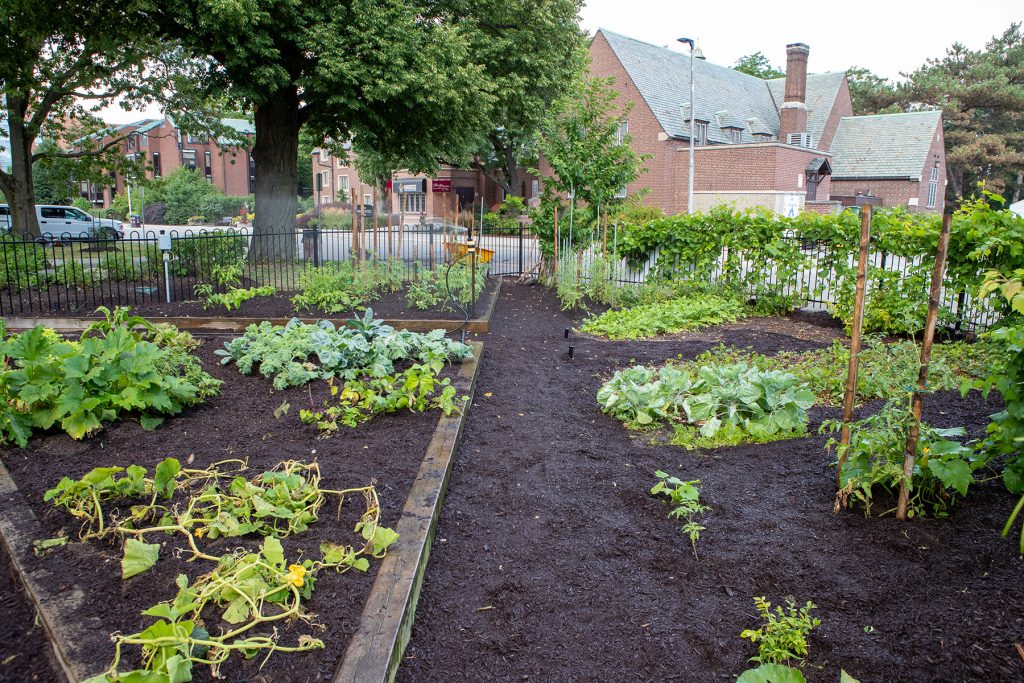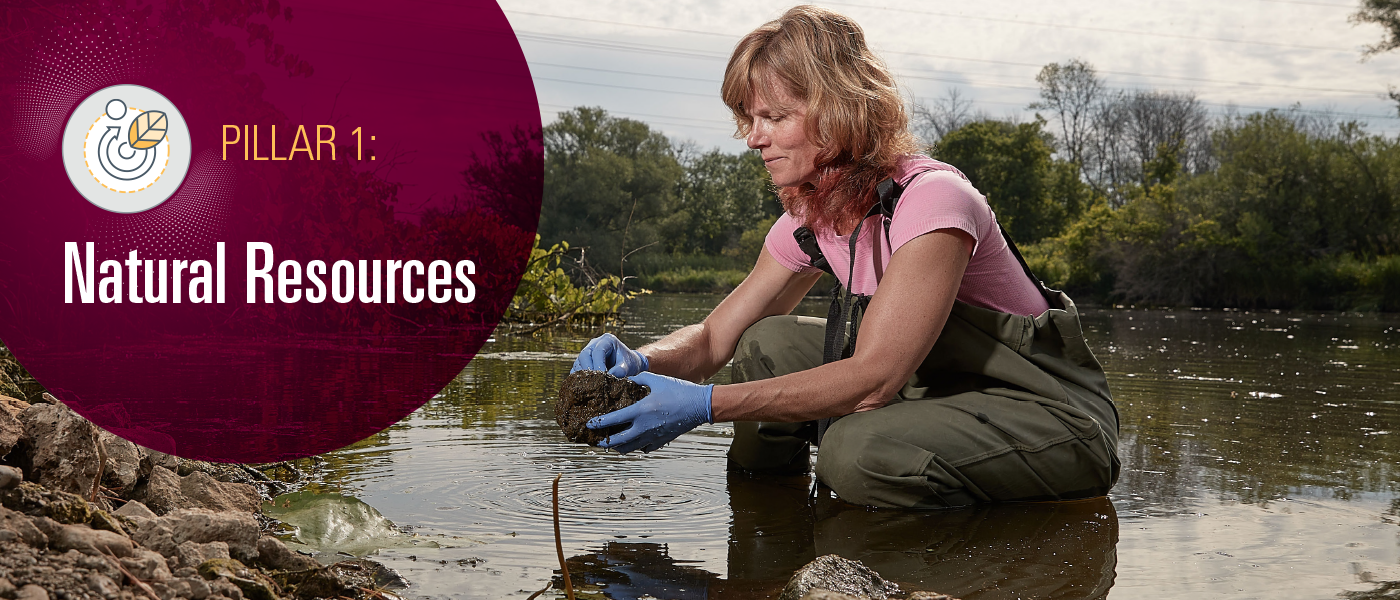Pillar 1: Natural Resources
Pictured Above: Karen Kidd, the Stephen A. Jarislowsky Chair in Environment and Health, researches the effects of human activities on the health of freshwater and marine ecosystems.
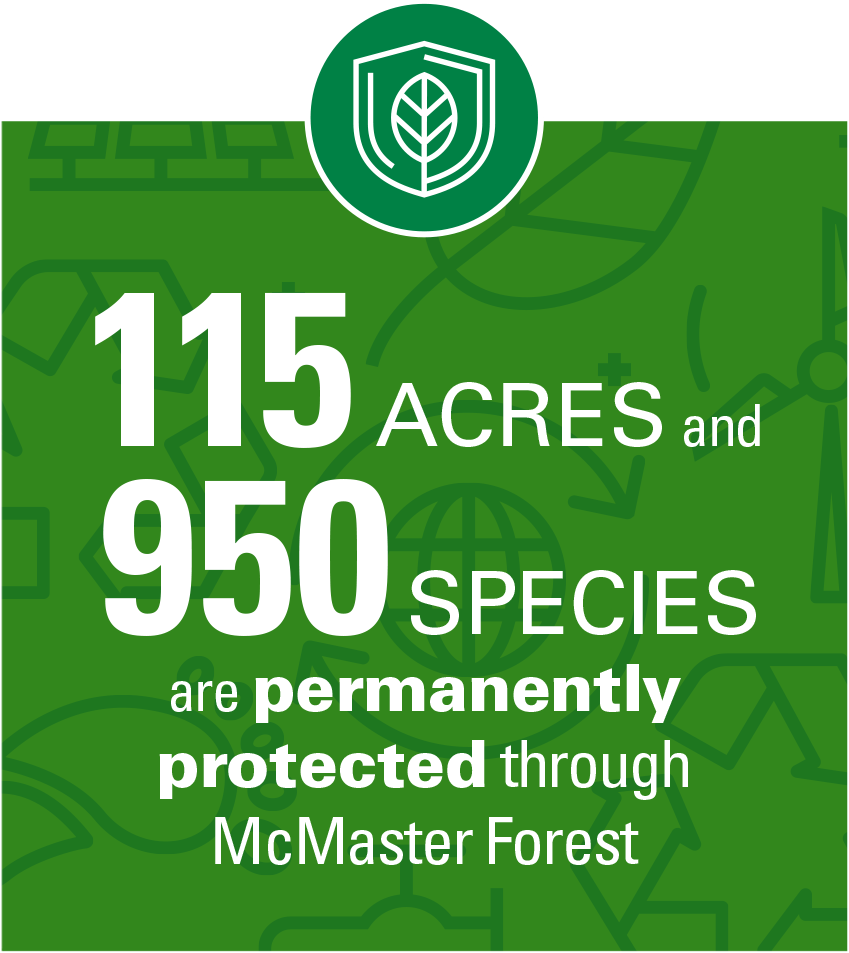
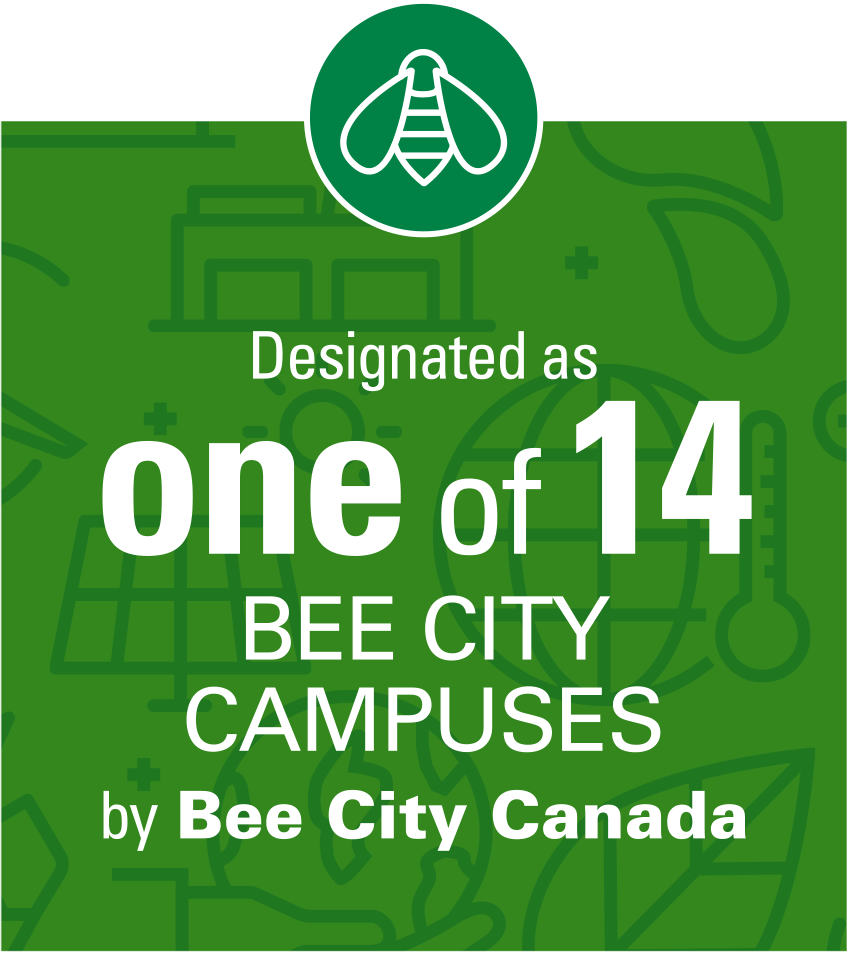
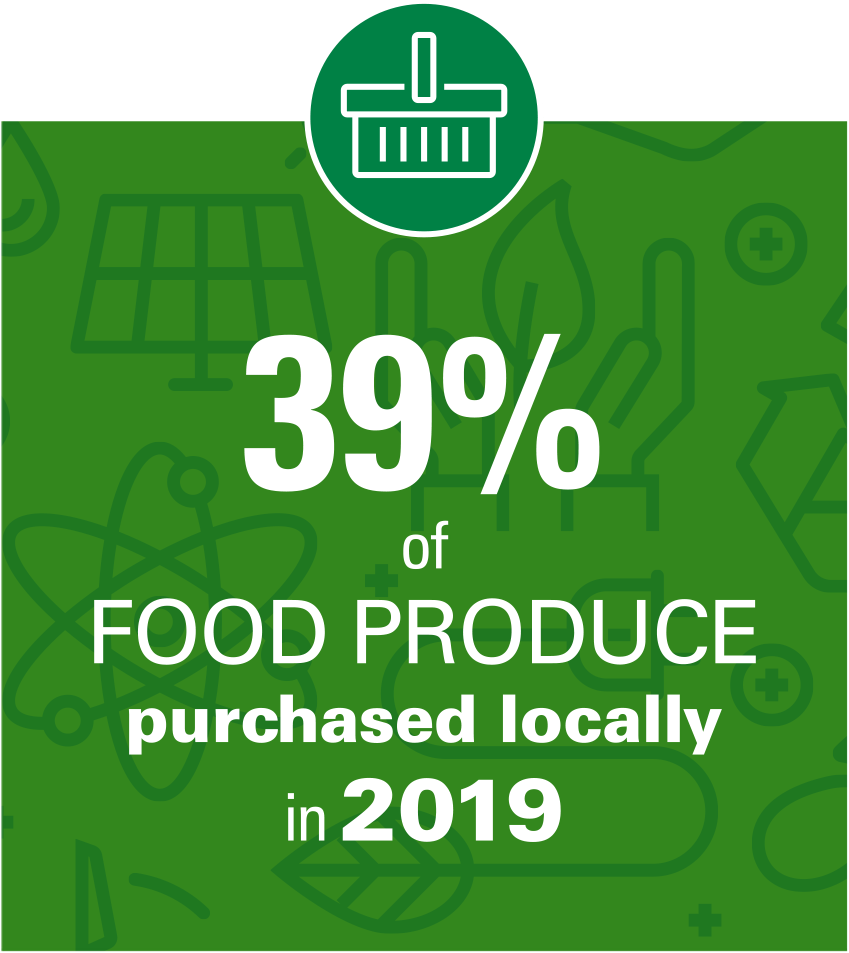

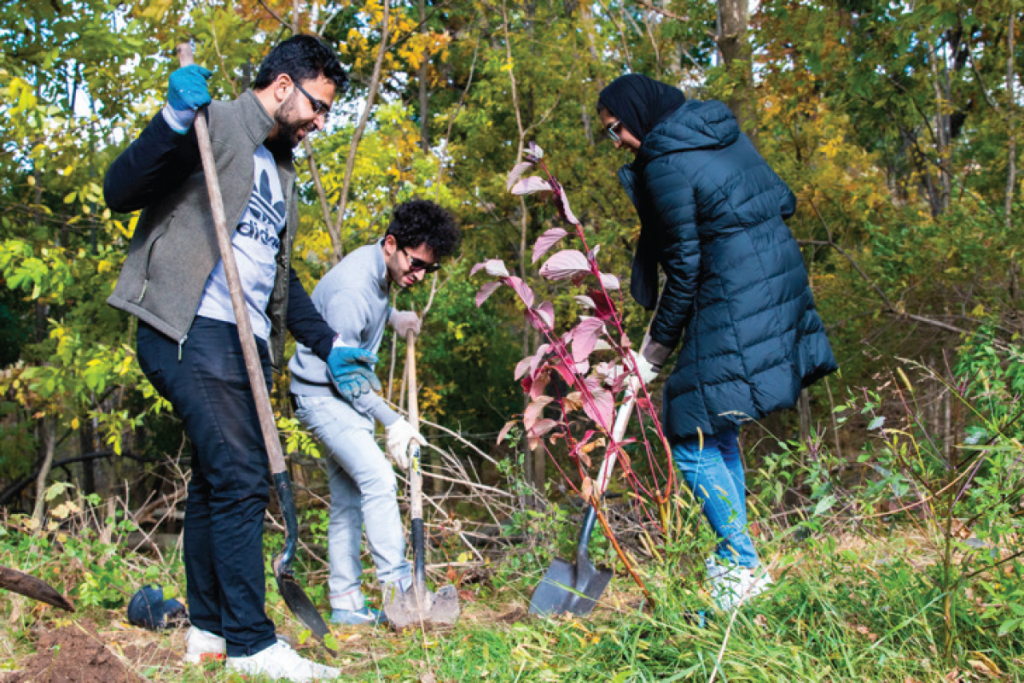
Conserving and protecting natural resources in a way that promotes the resilience of ecosystems and maintains ecological diversity and viability.
McMaster University sits adjacent to Cootes Paradise, a 600-hectare nature sanctuary owned and operated by Royal Botanical Gardens (RBG) and is also bordered by the Hamilton Conservation Authority. McMaster is one of nine partner organizations in the Cootes to Escarpment EcoPark System, a collaborative initiative to protect, restore and connect more than 3,900 hectares of natural lands at the western end of Lake Ontario. The university’s main campus comprises over 300 acres and contains approximately 5,000 trees, excluding woodland property, with new plantings added each year. McMaster recognizes its responsibility to maintain the ecological diversity and integrity of the natural lands and waters that surround it. The university aims to meet this responsibility through research, student engagement and ecological conservation initiatives and partnerships.
Information Box Group
Nature at McMaster
In 2016, the university launched Nature at McMaster, a university-wide resource for outreach, management and education on issues concerning natural lands, the environment, wildlife and sustainability both in and around McMaster University. Nature at McMaster runs stewardship and educational events across campus and assists Facility Services with the management of McMaster’s natural lands including McMaster Forest.
McMaster Sustainability Week: Tree Planting
In order to combat the prevalent issue of deforestation around the world, SUSTAIN students coordinated educational tree-planting events at McMaster. The goal of this project was to address the issue of tree decline by involving the Hamilton community in rehabilitation practices such as tree-planting and to educate individuals on the importance of long-term sustainability. Student, staff, faculty and community volunteers planted 80 trees during McMaster’s 2019 Sustainability Week. In 2020, a total of 100 trees were planted with the support of Nature at McMaster, Facility Services, Trees for Hamilton and the Academic Sustainability Programs Office.
McMarsh and Watershed Trust
The McMarsh project was initiated several years ago as a university-wide collaboration aimed at restoring an ecologically sensitive wetland located on Parking Lot M in the west campus.
McMarsh is a further expansion of a 30-metre buffer that was established around Parking Lot M in 2017 when 140 native trees and shrubs were planted where paving was removed to reduce the amount of runoff into nearby Coldwater Creek.
McMarsh is now part of a larger project which is reimagining a broader portion of the west campus. The Watershed Trust is currently being co-led by the Faculty of Humanities and the Faculty of Science and allows for opportunities for experiential learning and integrated campus-community projects in this area of the campus. Plans for McMarsh are currently being reviewed and the Watershed Trust initiative will be explored in more detail through the Campus Master Planning process to begin in 2021.
McMaster Forest
McMaster Forest is a permanently protected 115-acre plot of land owned by McMaster University in Ancaster. It is home to over 950 recorded species and approximately 25,000 trees currently being inventoried by students. In 2015, the McMaster University Senate and Board of Governors officially designated the property an environmentally significant natural land to be used for ecologically sensitive teaching, research and recreation purposes. Primary researchers include students and faculty from the McMaster Department of Biology, as well as members of the Hamilton Naturalist’s Club.
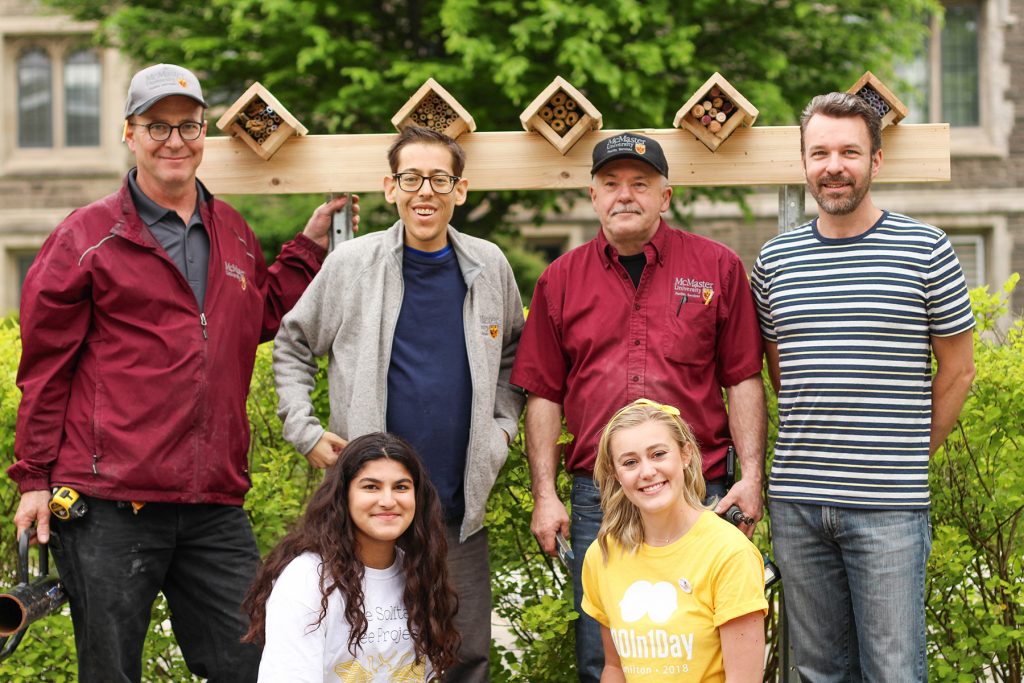
Spotlight: Meet the Bee Team
Since 2019, cohorts of students in the SUSTAIN 3S03 course have partnered with McMaster University Facility Services staff to protect vital pollinators as part of the Solitary Bee Project on campus.
Solitary bees, who do not live in hives, can be found laying eggs in the over 50 bee homes that students and Facility Services team members installed throughout campus in 2019. In 2020, the student cohort could not be physically together on campus during the COVID-19 pandemic. Through the power of social media, the entire community was invited to follow along as the facility services team planted 100-plus native trees and shrubs close to the bee houses. Also in 2020, the students successfully applied for McMaster to be designated a Bee City Campus.
“It was not until we filled out the application for McMaster to become a Bee City Campus that we really started seeing this was so much more than a grassroots project,” says Callum Hales, a commerce undergraduate student.
“Protecting pollinators like solitary bees also aligns with the United Nation’s Sustainable Development Goals related to zero hunger, life on the land, and sustainable cities.”
McMaster recognizes the importance of sustainability as it relates to food consumption on campus. The university also recognizes the intersection between sustainability and food security. The following highlights showcase efforts to support a sustainable food system on campus, as well as actions combating food insecurity for the McMaster community.
Information Box Group
Sustainable Food Purchasing
Hospitality Services recognizes the purchasing power it has to further support a sustainable food system on campus. Hospitality Services aims to increase the total amount of annual local produce and products purchased, cease uncertified fish purchases, ensure primary suppliers follow an ethical code of conduct and increase the total amount of socially responsible coffee purchased. In 2019, Hospitality Services decided to no longer support the purchase of fish that was not sustainably sourced. Acceptable fish products include Aquaculture Stewardship Council (ASC), Marine Stewardship Council (MSC) and Ocean Wise certified products. In addition, over 1500 lbs of sustainable coffee was purchased and 39% of produce purchased was locally sourced.
For more information visit the Hospitality Services 2019 Wellness & Sustainability Report.
MSU Food Collective Centre
The student-run Food Collective Centre is McMaster’s on campus food bank and food security resource. Dedicated to ensuring food is always accessible, the Food Collective Centre aims to cultivate stronger food systems in the McMaster and surrounding community, advocates for practices to improve food security and addresses the inequities related to accessible food as a natural resource. A number of support resources are offered to students, alumni, staff and Hamilton Community Partners. The Good Food Box is a non-profit project run by the MSU Food Collective Centre in partnership with Grace Lutheran Church to provide affordable, fresh produce to the McMaster Community with monthly boxes available for order
and pick up, right on campus.

Hospitality Services’ Signature Meals Program
The Signature Meals initiative was implemented by Hospitality Services in response to student feedback and recent evidence around food security rates among students. Food is a natural resource which may not always be accessible due to a range of societal inequities. Therefore, the Signature Meals program provides meals at a lower price point than market rate to increase access for all students who may be experiencing financial limitations during the school year.
Spotlight: McMaster Teaching and Community Garden celebrates a decade of growing relationships
In 2012, students from the Integrated Science Program (iSci) collaborated with Facility Services and the McMaster Students Union to open a vegetable garden on the North Side of the General Science Building. That summer, and every summer since, the McMaster Teaching & Community Garden promotes local food production and provides teaching and learning opportunities for the McMaster community.
In the summer of 2020, students were not permitted on campus due to pandemic restrictions and Facility Services team members continued with planting and upkeep. As the buds burst marking the start of the tenth growing season for the community garden, Facility Services began exploring new partnerships with student groups to plant vegetables and reinvigorate the garden for the start of another decade of learning and growing on campus.
